Are you prepared for the incredible journey of raising a puppy?
From their adorable little paws to their playful antics, puppies can bring so much joy to our lives.
But, did you know that puppy development and care play a crucial role in shaping their future?
How you raise your puppy can significantly impact their behavior, health, and overall well-being as they grow into adulthood.
Join us as we dive into the key stages of puppy development and provide you with essential tips to ensure your puppy gets the best care possible.
From training to socialization, nutrition to healthcare, we’ll cover all the necessary aspects of raising a healthy and happy puppy.
Get ready to embark on this exciting journey and discover the secrets to raising a well-rounded and well-behaved furry companion.
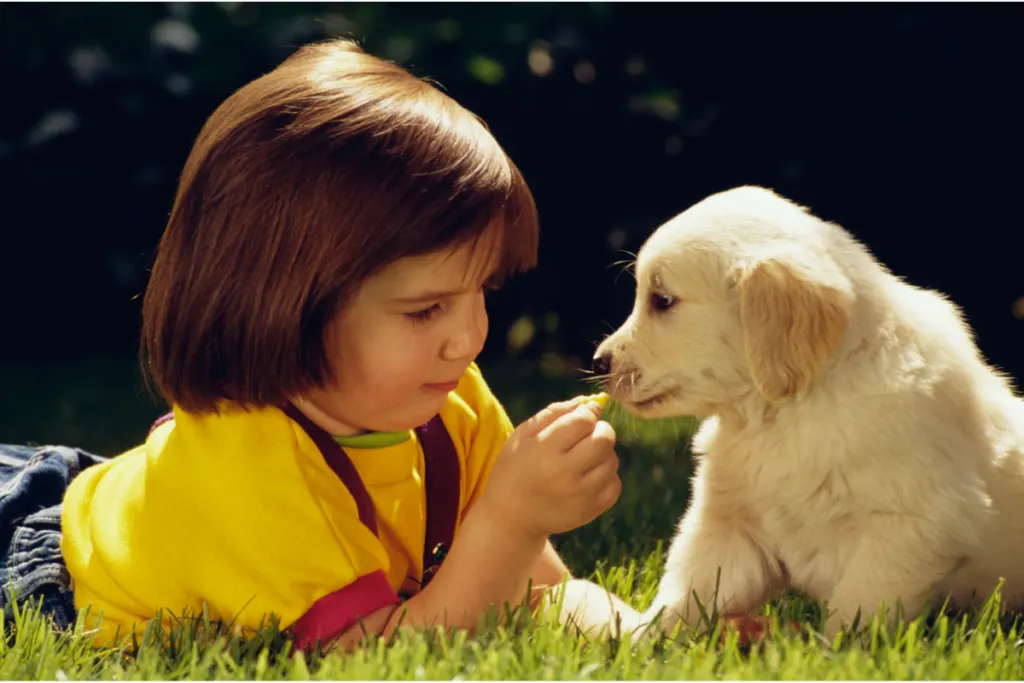
Click Here to Jump to a Section
Key Takeaways:
- Understanding the different stages of puppy development is crucial for providing effective care.
- Puppy training and socialization are essential for shaping your puppy’s behavior and creating a strong foundation for future learning.
- Proper nutrition and healthcare practices are vital for promoting your puppy’s overall health and well-being.
- Effective puppy grooming techniques help keep your furry friend clean, comfortable, and healthy.
- Dealing with puppy teething requires patience and specific strategies to ease their discomfort.
Understanding Puppy Growth and Milestones
As a puppy owner, it’s crucial to have a deep understanding of your furry friend’s growth and developmental milestones.
By being aware of these important stages, you can provide the necessary care and support for your puppy’s overall well-being.
Let’s explore the various stages of puppy growth and highlight key milestones to look out for.
Stage 1: Neonatal Period (0-2 weeks)
During this stage, puppies are completely dependent on their mother for nourishment and care.
Their eyes and ears remain closed, and they spend most of their time sleeping and nursing.
It’s essential to provide a warm and quiet environment to promote their healthy development.
Stage 2: Transitional Period (2-4 weeks)
This is a crucial stage when puppies start to open their eyes and ears.
They begin to explore their surroundings, wag their tails, and interact with littermates.
During this time, they also develop the important senses of taste and smell.
Introducing soft solid foods and providing safe opportunities for socialization are vital for their growth.
Stage 3: Socialization Period (4-12 weeks)
At this stage, puppies become more curious and eager to explore the world around them.
They learn important social and communication skills through interactions with their littermates, humans, and other animals. This is the perfect time to start positive reinforcement training and expose them to various environments, sounds, and experiences.
Stage 4: Juvenile Period (3-6 months)
Puppies experience rapid growth during this phase.
Their baby teeth start to fall out, and adult teeth begin to emerge.
They have bursts of energy and may exhibit some challenging behaviors as they test their boundaries.
Consistent training, appropriate exercise, and mental stimulation are key to guiding them through this stage.
Stage 5: Adolescence (6-18 months)
During adolescence, puppies go through hormonal changes and may exhibit typical teenage behavior. They continue to grow physically and mentally, and individual personalities start to emerge.
It’s important to remain patient and consistent with their training, ensuring they receive plenty of exercise and mental enrichment.
Stage 6: Adulthood (18 months and beyond)
By this stage, puppies have reached their full maturity.
However, their growth and development are ongoing, and their needs may change throughout adulthood.
Regular veterinary check-ups, a balanced diet, exercise, and continued mental stimulation are essential for their lifelong health and well-being.
Understanding the different stages of puppy growth and being aware of important milestones allows you to provide the necessary support and care for your furry companion.
By nurturing their development and meeting their needs, you can build a strong and lasting bond that will enrich both your lives.
| Stage | Description |
|---|---|
| Neonatal Period (0-2 weeks) | Puppies are completely dependent on their mother for nourishment and care. They spend most of their time sleeping and nursing. |
| Transitional Period (2-4 weeks) | Puppies start to open their eyes and ears. They begin to explore their surroundings, interact with littermates, and develop their senses of taste and smell. |
| Socialization Period (4-12 weeks) | Puppies become more curious and eager to explore. They learn important social and communication skills through interactions with their littermates and humans. |
| Juvenile Period (3-6 months) | Puppies experience rapid growth, teething, and testing boundaries. Consistent training, exercise, and mental stimulation are crucial. |
| Adolescence (6-18 months) | Puppies go through hormonal changes and may exhibit teenage behavior. Continued training, exercise, and mental enrichment are vital. |
| Adulthood (18 months and beyond) | Puppies have reached full maturity, but growth and development continue. Regular veterinary check-ups, balanced diet, exercise, and mental stimulation are essential. |
Nurturing a Healthy Puppy: Nutrition and Health Care
Proper nutrition and healthcare are crucial for the overall well-being of your puppy.
In this section, we will discuss the essential elements of puppy nutrition and provide guidance on maintaining your puppy’s health through proper healthcare practices.
Feeding Your Puppy: Key Considerations
When it comes to puppy nutrition, it’s important to choose a diet that meets their specific needs.
Puppies require a balanced diet that supports their growth and development. Here are some key considerations:
- Select a high-quality puppy food formulated for their age and breed.
- Follow the recommended feeding guidelines provided by the manufacturer.
- Feed your puppy a combination of dry and wet food for variety and hydration.
- Avoid feeding them human food, which can be harmful to their health.
- Monitor their weight and adjust the portion sizes accordingly.
Remember to provide clean, fresh water at all times to keep your puppy hydrated.
The Importance of Regular Veterinary Care
To ensure your puppy’s health, regular veterinary care is essential.
Your veterinarian will be able to provide guidance on vaccinations, preventive treatments, and general health assessments. Here are some key aspects of puppy healthcare:
- Schedule regular check-ups with your veterinarian to monitor your puppy’s growth and overall health.
- Follow the recommended vaccination schedule to protect your puppy from common diseases.
- Discuss preventive measures for parasites such as fleas, ticks, and heartworms.
- Consult your veterinarian about spaying or neutering your puppy to prevent unwanted pregnancies and certain health conditions.
Regular veterinary care ensures that any health issues are identified and addressed promptly, giving your puppy the best chance for a long and healthy life.
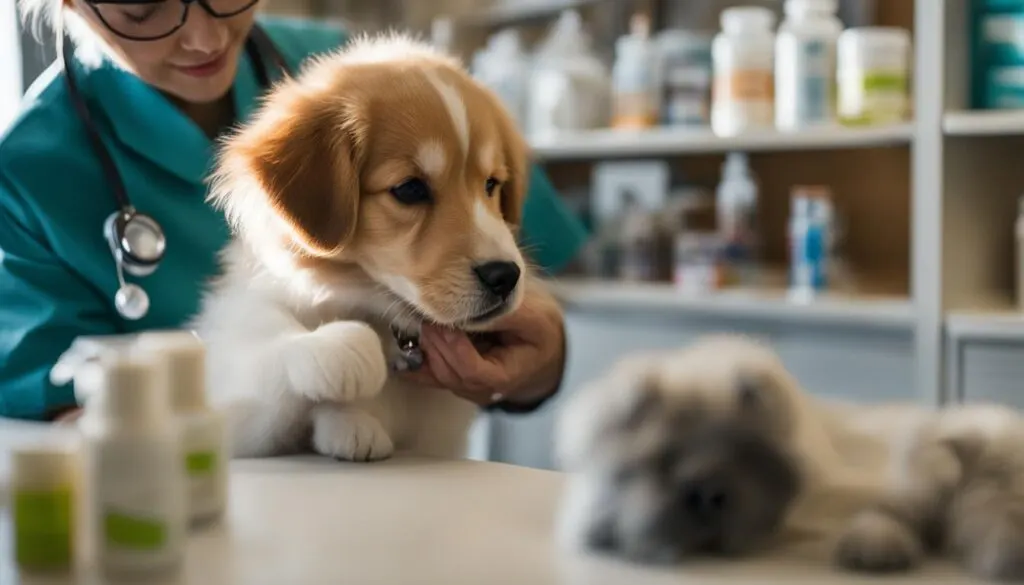
By providing proper nutrition and healthcare, you can ensure that your puppy grows into a healthy and happy dog.
In the next section, we will explore the importance of training your puppy and provide effective techniques for successful obedience training.
Building a Strong Foundation: Puppy Training Techniques
Training your puppy is an essential part of their development and care.
It sets the groundwork for a well-behaved and obedient companion. With the right techniques, you can raise a confident and disciplined puppy.
Here are some effective puppy training tips to help you get started:
Socialization
Socializing your puppy is crucial for their emotional and behavioral development.
Introduce them to new environments, people, and animals. Gradually expose them to different stimuli to help them become comfortable and adaptable.
Positive Reinforcement
Use positive reinforcement techniques to encourage good behavior in your puppy.
Reward them with treats, praise, and affection when they follow commands or exhibit desired behaviors.
This approach helps them associate obedience with positive experiences.
Consistency
Consistency is key when training your puppy.
Establish clear rules and boundaries, and ensure that everyone in the household follows them consistently.
This helps your puppy understand what is expected of them and prevents confusion.
Short Training Sessions
Puppies have short attention spans, so keep training sessions brief and engaging.
Aim for 5-10 minutes of focused training at a time.
This helps prevent frustration and keeps your puppy engaged and receptive to learning.
Patience and Persistence
Remember that puppy training takes time and patience.
Be persistent and consistent in your efforts. Use positive reinforcement techniques to encourage desired behaviors, and avoid punishment-based methods that can lead to fear or aggression.
Professional Training
If you’re struggling with training or need additional guidance, consider enrolling your puppy in a professional obedience training program.
Trainers have the expertise to address specific behavioral issues and provide personalized training plans.
By implementing these training techniques, you can lay a solid foundation for your puppy’s future behavior and ensure they grow into a well-behaved and happy dog.
The Power of Socializing Your Puppy
Socializing your puppy is a crucial aspect of their development and care.
It involves exposing them to a variety of environments, people, and animals from a young age, helping them build confidence and essential social skills.
Early socialization lays the foundation for a well-adjusted adult dog.
It helps prevent behavioral issues and anxiety, making your furry friend a joy to be around. Here are some strategies for successful puppy socialization:
- Introduce your puppy to different places: Take your puppy to various locations such as parks, pet-friendly stores, and busy streets. Exposing them to different sights, sounds, and smells will help them adapt to new environments later in life.
- Expose them to different people: Encourage friendly interactions with people of different ages, sizes, and appearances. This will help your puppy become comfortable with a diverse range of individuals they may encounter in the future.
- Arrange playdates with other puppies: Interactions with fellow puppies are essential for socializing. Organize playdates or enroll your puppy in a well-supervised puppy socialization class where they can learn appropriate play behaviors and develop good social skills.
- Introduce new experiences gradually: Ensure socialization occurs at your puppy’s pace. Gradually increase the level of difficulty by introducing them to new experiences one step at a time. This approach will prevent overwhelming or fearful reactions.
- Positive reinforcement: Reward your puppy with treats, praise, and affection when they exhibit calm and confident behavior during socialization. This positive reinforcement will reinforce their positive associations with new experiences.
Remember to prioritize your puppy’s safety during socialization.
Keep a close eye on their interactions and monitor their comfort level.
If you notice any signs of fear or aggression, seek guidance from a professional dog trainer or behaviorist.
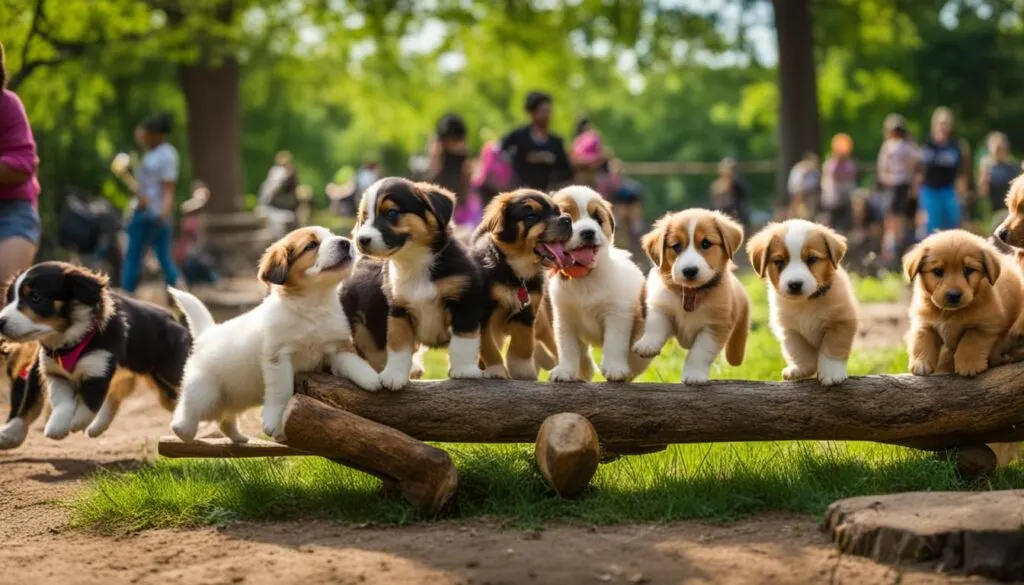
Puppy Behaviour: Understanding and Addressing Common Issues
During the early stages of a puppy’s development, it is common for certain behavioral issues to arise.
Understanding these behaviors and knowing how to address them effectively is essential for providing proper care and guidance to your furry friend.
Common Puppy Behavioral Issues
- Biting and nipping
- Jumping up
- Excessive barking
- Potty training challenges
- Eating inappropriate objects
These are just a few examples of the common behavioral issues that puppies may experience.
It’s important to remember that these behaviors are often a result of their natural instincts and the learning process they go through as they adapt to their new environment.
As a responsible puppy owner, it’s crucial to address these issues promptly to ensure your puppy grows into a well-behaved and balanced adult dog.
Let’s explore some effective strategies for managing and correcting these behaviors.
Addressing and Correcting Puppy Behavioral Issues
1. Biting and Nipping: Teach your puppy bite inhibition by redirecting their attention to appropriate chew toys and discouraging rough play. Provide positive reinforcement when your puppy demonstrates gentle behavior.
2. Jumping Up: Avoid encouraging jumping by not rewarding this behavior with attention. Instead, teach your puppy to sit or stay when greeting people and provide treats when they obey.
3. Excessive Barking: Identify the underlying cause of the excessive barking, such as boredom, anxiety, or the need for attention. Address the root cause and provide mental and physical stimulation to redirect their energy.
4. Potty Training Challenges: Establish a consistent routine for bathroom breaks and reward your puppy for eliminating in the designated area. Avoid punishment and be patient, as accidents are part of the learning process.
5. Eating Inappropriate Objects: Remove access to objects that could be harmful or cause digestive issues. Provide plenty of appropriate chew toys and redirect your puppy’s attention to them when they try to chew on forbidden items.
Remember, consistency, positive reinforcement, and patience are key when addressing and correcting behavioral issues in puppies. Seek guidance from a professional dog trainer or behaviorist if needed.
| Behavioral Issue | Recommended Approach |
|---|---|
| Biting and Nipping | Teach bite inhibition, redirect to chew toys, and provide positive reinforcement for gentle behavior. |
| Jumping Up | Avoid rewarding jumping, teach obedience commands, and reinforce positive behavior with treats. |
| Excessive Barking | Identify the cause, redirect energy through mental and physical stimulation, and provide appropriate outlets for barking. |
| Potty Training Challenges | Establish a routine, reward proper elimination, and be patient during the learning process. |
| Eating Inappropriate Objects | Remove access to forbidden objects, provide appropriate chew toys, and redirect attention. |
Vaccinations and Preventative Care for Puppies
Ensuring your puppy’s long-term health and well-being involves proactive measures such as vaccination and preventative care.
By staying on top of your puppy’s immunizations and implementing preventive measures, you can protect them from various diseases and common health issues.
Why Vaccinations are Essential
Vaccinations play a crucial role in safeguarding your puppy’s health by providing immunity against contagious and potentially life-threatening diseases. They stimulate your puppy’s immune system to produce protective antibodies, helping them fight off infections.
When scheduling your puppy’s vaccinations, it is essential to follow the vaccination schedule recommended by your veterinarian.
This schedule typically starts at around six to eight weeks of age and continues at regular intervals until your puppy is fully vaccinated, usually at around 16 weeks.
Common vaccinations for puppies include:
- Distemper
- Parvovirus
- Hepatitis
- Parainfluenza
- Rabies
In addition to these core vaccines, your veterinarian may recommend additional vaccinations based on your puppy’s lifestyle and risk factors.
Preventive Care for Your Puppy
Alongside vaccinations, preventive care measures are essential to maintain your puppy’s health and well-being.
Regular veterinary check-ups, parasite control, and a balanced diet are key components of preventive care.
During routine veterinary visits, your veterinarian will conduct thorough examinations to assess your puppy’s overall health, detect any early signs of illness, and provide necessary treatments or preventive measures.
Regular check-ups allow your veterinarian to monitor your puppy’s growth and development and address any concerns promptly.
Parasite control is another important aspect of preventative care.
External parasites, such as fleas and ticks, can transmit diseases to your puppy, while internal parasites, such as worms, can cause a range of health issues.
Your veterinarian will recommend appropriate preventive treatments to keep your puppy protected.
A well-balanced diet is essential for your puppy’s growth and development.
Choose a high-quality puppy food that meets their specific nutritional needs. Consult with your veterinarian to determine the appropriate feeding schedule and portion sizes for your puppy’s age and breed.
By prioritizing vaccinations and implementing preventive care measures, you can ensure the long-term health and well-being of your beloved puppy.
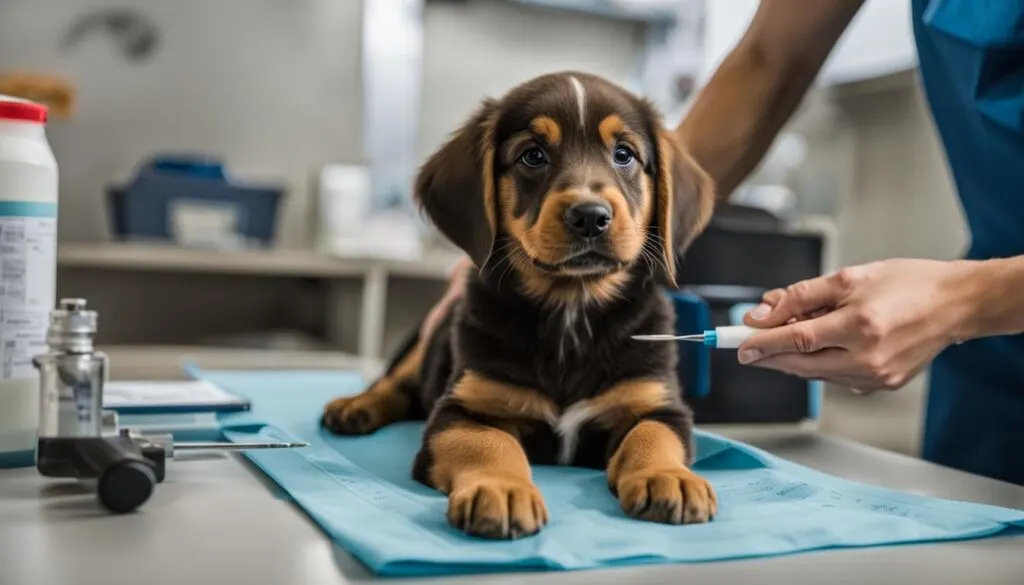
Keeping Your Puppy Well-Groomed
Regular grooming is an essential part of caring for your puppy. Not only does it help maintain their hygiene, but it also keeps their coat healthy and shiny. In this section, we will provide guidance on how to properly groom different areas of your puppy’s body, ensuring they look and feel their best.
Grooming Essentials
Before you start grooming your puppy, gather the following essential grooming tools:
- Gentle dog shampoo
- Conditioner (if needed)
- Dog brush or comb suitable for your puppy’s coat type
- Nail clippers or grinder
- Ear cleaner and cotton balls
- Toothbrush and dog-friendly toothpaste
- Grooming wipes
Having these tools ready will make the grooming process smoother and more enjoyable for both you and your puppy.
Bathing Your Puppy
Regular baths are necessary to keep your puppy’s coat clean and free from dirt and odors. Here’s a step-by-step guide to bathing your puppy:
- Prepare the bathing area, ensuring it is warm and free from drafts.
- Wet your puppy’s coat thoroughly, avoiding their eyes and ears.
- Gently massage the dog shampoo into their fur, creating a rich lather.
- Rinse your puppy’s coat thoroughly with warm water, ensuring all shampoo residue is removed.
- If necessary, apply conditioner and rinse it out accordingly.
- Use a towel to gently dry your puppy, being careful not to rub their coat vigorously.
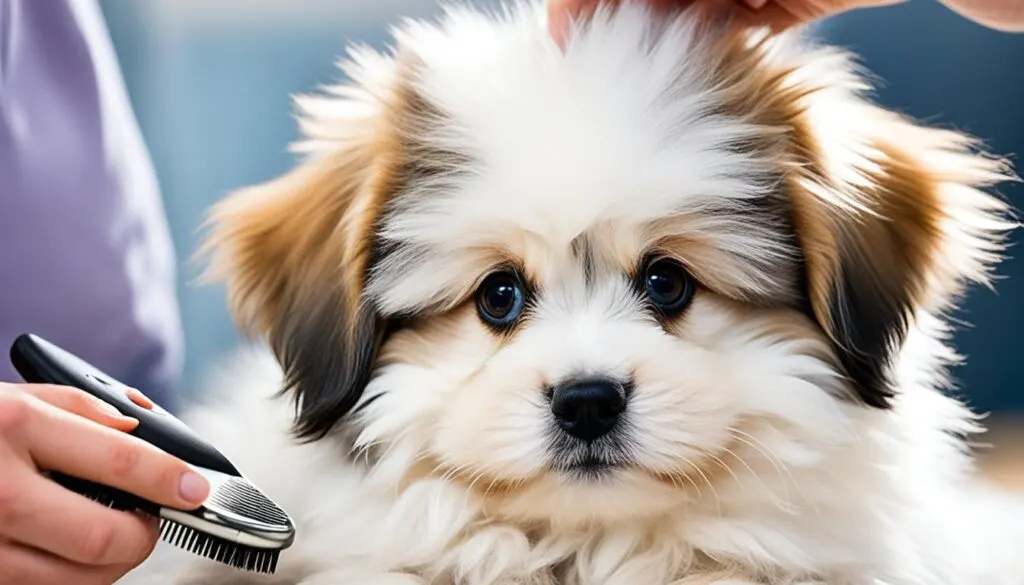
Brushing Your Puppy’s Coat
Brushing your puppy’s coat helps remove loose fur, prevents matting, and stimulates blood circulation. The type of brush you use will depend on your puppy’s coat type. Here are some common coat types and suitable brushes:
| Coat Type | Recommended Brush |
|---|---|
| Short-haired | Bristle brush or grooming mitt |
| Medium-haired | Slicker brush |
| Long-haired | Pinning brush or comb |
Regardless of the brush type, always start brushing from the neck and work your way down to the tail. Be gentle and take your time, ensuring you don’t cause any discomfort to your puppy.
Other Grooming Considerations
In addition to bathing and brushing, there are other areas of your puppy’s body that require attention:
- Nails: Regularly trim your puppy’s nails using a dog nail clipper or grinder. Be cautious not to cut too close to the quick, which is the sensitive area inside the nail.
- Ears: Clean your puppy’s ears with an ear cleaner and cotton balls to remove wax and debris. Check for any signs of infection, such as redness or a foul odor, and consult your veterinarian if necessary.
- Teeth: Establish a dental care routine by brushing your puppy’s teeth with a dog-friendly toothbrush and toothpaste. This helps prevent dental issues and keeps their breath fresh.
- Hygiene: Use grooming wipes to clean your puppy’s paws, face, and other areas as needed. This helps maintain their overall hygiene between baths.
By incorporating regular grooming into your puppy’s care routine, you are not only ensuring their physical well-being but also strengthening the bond between you and your furry companion.
Dealing with Puppy Teething: Tips and Tricks
Puppy teething can be a challenging phase for both puppies and their owners. As your puppy’s adult teeth start to emerge, they may experience discomfort, soreness, and a strong urge to chew. Understanding how to alleviate their discomfort and redirect their chewing behavior is crucial to ensure a smooth transition through this developmental stage.
1. Provide Appropriate Chew Toys
To soothe your teething puppy’s gums and satisfy their chewing urges, offer a variety of safe and durable chew toys. Look for toys specifically designed for teething puppies, such as rubber or nylon toys.
Avoid giving your puppy items like socks or shoes, as this may encourage them to chew on inappropriate objects.
2. Use Cooling Treats
The coolness can help numb your puppy’s gums and provide relief during the teething process.
You can try freezing a damp washcloth or offering them frozen treats made from low-sodium broth or unsweetened yogurt.
Remember to supervise your puppy while they enjoy these treats to ensure they don’t chew and swallow any small pieces.
3. Encourage Positive Chewing Habits
Redirect your puppy’s chewing behavior onto appropriate items by offering praise and rewards when they chew on their toys.
Whenever you catch your puppy chewing on something they shouldn’t, gently redirect their attention to a chew toy and encourage them to chew on it instead.
4. Avoid Punishment
It’s important to remember that teething is a natural process, and your puppy is not intentionally being destructive.
Avoid punishing or scolding them for chewing on inappropriate items. Instead, focus on providing appropriate alternatives and guiding them towards positive chewing habits.
5. Keep Your Puppy Active
Regular exercise and playtime can help distract your teething puppy from their discomfort and reduce excessive chewing.
Engage in interactive play sessions, take them for walks, or provide puzzle toys that stimulate their mind and body to help them expend their energy in a positive way.
By providing your teething puppy with appropriate chew toys, cooling treats, positive reinforcement, and engaging activities, you can help them navigate through this phase with minimal discomfort and damage to your belongings.
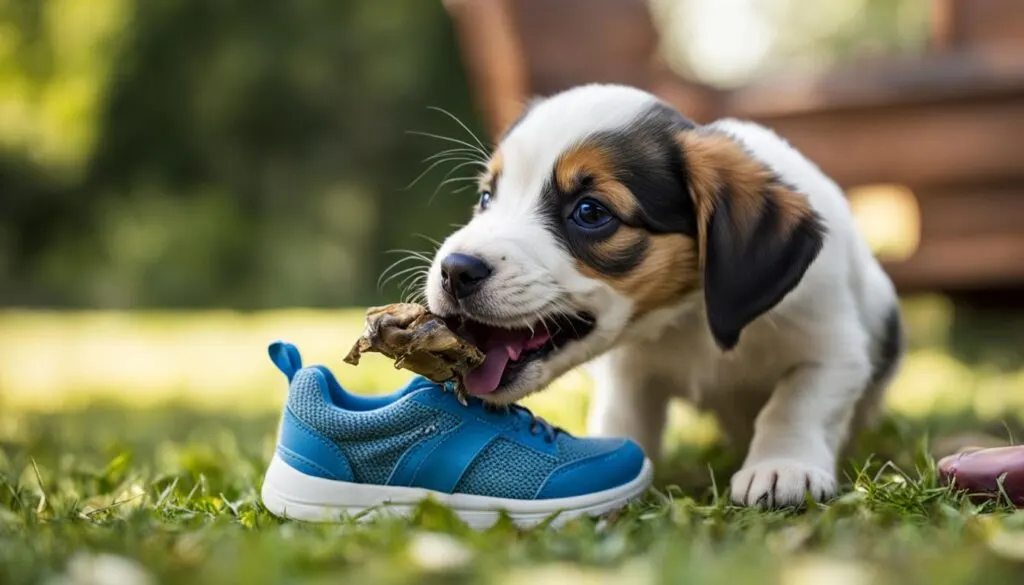
| Tips for Dealing with Puppy Teething |
|---|
| Provide appropriate chew toys to alleviate discomfort and redirect chewing behavior. |
| Offer cooling treats to soothe teething gums. |
| Encourage positive chewing habits and redirect inappropriate chewing. |
| Avoid punishing your puppy for teething behavior. |
| Keep your puppy active to distract from discomfort and reduce excessive chewing. |
Long-Term Puppy Care: Setting Your Dog Up for Success
As your adorable puppy grows into a beloved companion, it’s essential to provide them with the care and support they need for a happy and healthy life.
Transitioning from puppy to adult dog requires careful attention to their evolving needs. Here are some tips to help you set your furry friend up for long-term success.
1. Maintain a Consistent Routine: Dogs thrive on routine, so it’s important to establish consistent feeding, exercise, and sleep schedules.
Maintaining a predictable routine helps reduce anxiety and provides your dog with a sense of stability and security.
2. Continue Training and Mental Stimulation: Even as your puppy grows older, training should not stop.
Engage in regular training sessions to reinforce good behavior, strengthen the bond between you and your dog, and keep their minds sharp. Incorporating mental stimulation activities, such as puzzle toys or scent games, can also help prevent boredom.
3. Regular Veterinary Check-ups: Just like humans, dogs require regular health check-ups to ensure their well-being.
Schedule annual veterinary visits for vaccinations, dental care, and overall health examinations.
Regular check-ups allow early detection and treatment of any potential health issues, keeping your furry friend in optimal condition.
4. Adapt Nutrition to Changing Needs: As your puppy grows into an adult dog, their nutritional needs will evolve.
Consult with your veterinarian to determine an appropriate diet and feeding schedule for your dog’s size, breed, and activity level.
Providing them with balanced nutrition is crucial for maintaining their overall health and preventing weight-related issues.
By following these tips for long-term puppy care, you can ensure a smooth transition from playful pup to cherished adult dog.
Remember, your furry friend is relying on you for their well-being, so investing time, effort, and love into their care will lead to a lifetime of joy and companionship.
